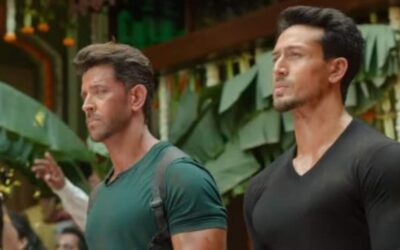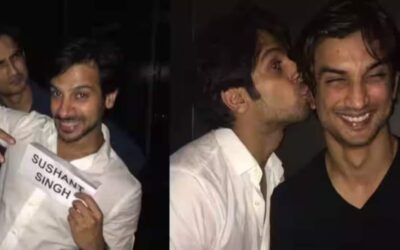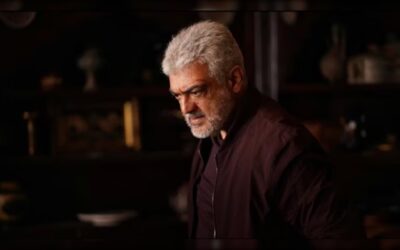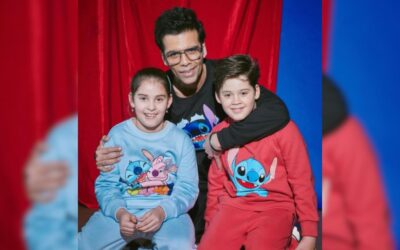
Self-assured is one thing that actor Boman Irani’s directorial debut, The Mehta Boys, definitely is. It is a refreshingly unpretentious father-son drama that neither strives for gratuitous pace nor looks for pronounced complexity and yet manages to be not only thought-provoking but also emotionally involving.
The director is also the lead actor and co-producer of the Amazon Prime Video film but he clearly isn’t weighed down by the workload. He maintains a firm grip on a narrative centred on a 71-year-old Navsari-based man coming off the demise of his wife and his fraught relationship with his only son, an architect who flew the coop a decade ago in pursuit of a career in Mumbai.
The Mehta Boys, scripted by Boman Irani and Oscar-winning screenwriter Alexander Dinelaris (Birdman), isn’t crammed with high drama, surprise twists and radical themes. It has its share of emotive highs and performative crescendos but that does not deflect it off its clean, even and realistic arc.
Widower Shiv Mehta (Irani), an independent-spirited man who prefers to be left to his own devices, is persuaded by his daughter, Anu (Puja Sarup), his firstborn, to accompany her Tampa, Florida, where she lives with her family.
It isn’t easy for the septuagenarian to bid goodbye to the Navsari bungalow that has been his home for seven decades or part of his life’s collection of objects he holds dear, including a cricket bat autographed by Sunil Gavaskar. But he agrees to fly out of the country now that his wife is no more.
He asks his son Amay Mehta (Avinash Tiwary), a man who has drifted away physically and temperamentally from his father: “America mein cricket khelte hain na (The play cricket in America, don’t they)?” The gentleman’s sport means the world to him.
On his way out of India, Shiv is forced by circumstances to postpone his departure and stay on in Mumbai for a couple of days with his estranged son. There is little love lost between them. Soon enough, the two men start bickering.
While Shiv clings to memories of the life that he shared with his deceased wife – a soulmate he misses desperately – Amay struggles to find a footing in the present by breaking away from his past. He does not say so in so many words, but there is reason to suspect that, as an architect and a man, he is ill at ease with his small-town legacy.
Father and son haven’t seen eye to eye since Amay moved to Mumbai. The reason for the falling-out between the two men isn’t revealed until late in the film when a violent disagreement between them triggers an all-out confrontation and the beginning of a new crisis.
In Amay’s Mumbai apartment, a framed photograph tells a story. There is no place in it for his father. It is one of the first things that Shiv notices on arrival but he isn’t surprised. His wife is at the centre of the picture and that is probably what matters to him more than anything else.
Shiv Mehta, in fact, has visions of his late wife triggered by women he spots (in a restaurant, an elevator and a market) with flower garlands around their hair buns. Recollections of his departed life partner follow him around pretty much like his own shadow – and that of another father figure in Amay’s life, his mentor and owner of the architecture firm he works for, surrounds his son.
The cityscape plays a crucial role in the film and in the relationship between father and son. The possibility of amending an urban skyline and the prospect of mending a broken family bond, in a subterranean way, mirror each other in The Mehta Boys.
Amay, whose employer (Siddhartha Basu), proprietor of Sen and Son Architects, acknowledges that he has the makings of a genius but is still nowhere near fulfilling his promise.
Does the secret of unlocking his true potential lie in his father’s past, who once ran a typewriting school and spent his free time umpiring cricket matches, as well as in his architectural practice’s history? The answer to that question appreciably expands the thematic scope of the film.
Amay lives in a top-floor apartment because of the view of Mumbai that it offers. But what his father sees inside the pad isn’t encouraging at all. Paint peels off the walls and when the monsoon dumps a load of rain on the building, the ceiling leaks.
Shiv isn’t here to stay. He is in transit. This could well be the final trip of his life – from his hometown to his daughter’s American abode. So, it is not the condition of Amay’s flat that shocks him as much as the excess of glass and steel that dominates the skyline does. “All cities look the same,” the old man laments. “India does not look like India.”
Amid the constant war of words between him and his dad, Amay works on a bid for a prestige project – the design of a new university planned by the city’s richest man to showcase “a new emerging India”. Nothing less than a spectacularly good idea will make the cut. Pressure mounts on him to deliver,
Professional challenges overlap with personal hiccups in the course of a few days. His father insists on paying for dinner with Amay’s colleague, Zara (Shreya Chaudhry), who does the budgeting for plans and projects. Shiv has been led to believe that Zara is the woman in his son’s life. His presumption generates some mirth but the night ends messily. It aggravates the already precarious equations between “the Mehta boys”.
The building, breaking and rebuilding of bonds is at the centre of Amay’s story. He is a diligent worker but that one big career-altering idea still eludes him. His father cannot let go of the past. Amay is unable to work out a road map for the future. The boss wonders aloud why he pays Amay as much as he does.
Through the camera of the director of photography Krish Makhija, we frequently see a sliver of the city skyline from the door to Amay’s balcony. It glitters at night but are the bright lights enough to dispel the darkness that envelopes the young architect’s vision?
Amay’s retired father still believes the greatest ideas are born when humans work with pen and paper. But in the midst of a power cut, Amay is rendered helpless without his computer. The father’s old-school philosophy and the son’s thought process are polar opposites.
Their joint struggle to let bygone be bygones before the old man is gone for good forms the core of The Mehta Boys. The heart-warming drama is enlivened by the wonderful central performances from Boman Irani and Avinash Tiwary, perfectly complemented by Shreya Chaudhry. It is watchable all the way.
Search
Recent
- AP Dhillon will participate in 2025 Ruffles NBA all-star celebrity game
- Pandit Ravi Shankar`s youngest disciple Rishab Rikhiram Sharma to embark on tour
- Mekedatu dam hangs in balance as Centre says no approval yet TOI
- ISL: FC Goa secure comfortable 2-1 win over 10-men Odisha FC
- Jeet Adani weds Diva Shah: All you need to know about the Adani scion`s wedding





